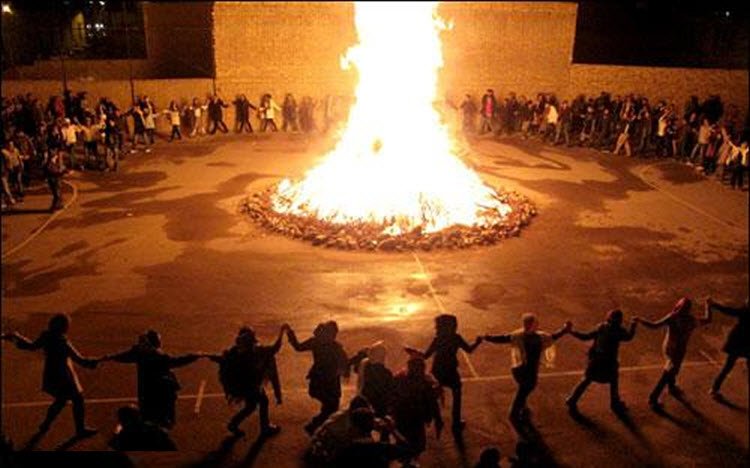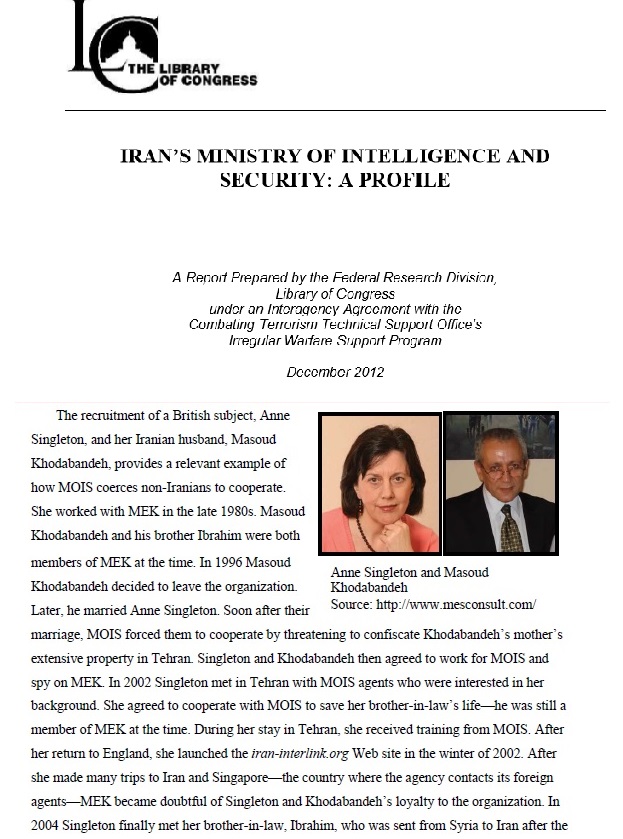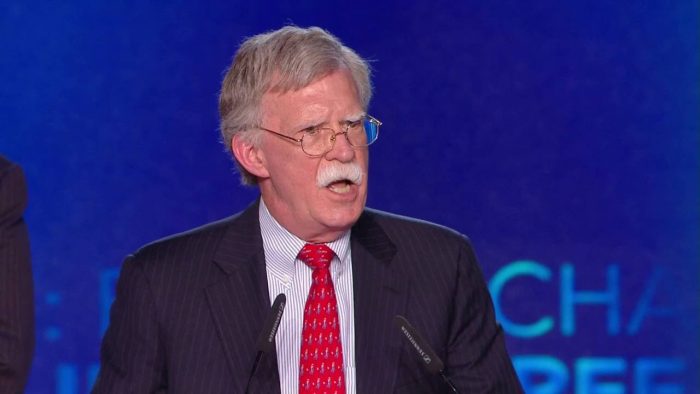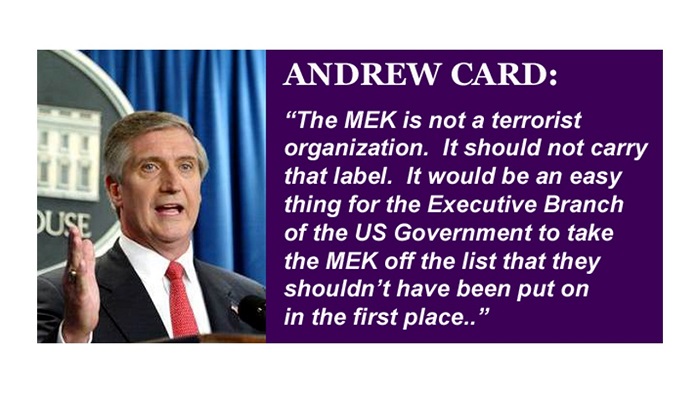POLITICAL PLATFORM
Demonstrations were staged in cities across Iran to take place during the yearly Fire Fest celebration, which marks the last week of Iran’s calendar year.
ISJ Report Warns of Potential Attack on MEK in Albania On Wednesday the International Committee In Search of [...]
John Bolton represents a new chapter in US-Iran relations Donald Trump’s appointment of John Bolton as the president’s [...]
False Terrorism Tag
Andrew Hill Card Jr. is an American politician who was White House Chief of Staff under President George W. Bush from 2001 to 2006, as well as head of Bush’s White House Iraq Group.
Introduction
On September 28, 2012, the Mujahedin-e Khalq or People’s Mujahedin of Iran (MEK/PMOI), a pro-democratic resistance organization in Iran, was removed from the Foreign Terrorist Organization (FTO) list, ending a 15-year-long shameful saga.
The MEK (PMOI) should never have been designated a terrorist organization and was listed as an FTO not because of any evidence, but as a means to curry favor with Iran’s clerical regime. Before the US delisting in 2012, the UK, France, and the European Union had removed the PMOI from their terrorist lists.
The Western governments, to justify designating the MEK (PMOI) as a terrorist group, ignored factual information about the People’s Mojahedin and instead relied on false and malicious propaganda generated by Iran’s Ministry of Intelligence and Security (MOIS).
The MEK (PMOI) mounted court cases to challenge the politically motivated terrorist designations. In every instance, the courts sided with the MEK (PMOI) and found no evidence to support the terrorist designations. After the court rulings, government agencies in the US, UK, France, and EU refused to readily comply with the decisions, seeking to maintain the resistance organization on the terrorist lists as long as possible.
In the end, pressure from the courts and a broad coalition of political leaders in support of the MEK (PMOI) forced the government agencies to delist the resistance organization.
While the PMOI ultimately prevailed in the courts, its success came at a high cost. For 15 years, Iran’s mullahs were able to use the false terrorism tag to undercut the MEK (PMOI)’s reputation and stifle its efforts to bring regime change in Iran. Additionally, the wrongful designation:
- Led to the further demonization of the MEK (PMOI) by Iran and its proxies in the West, weakening pro-democracy forces both in and outside Iran, and this, in turn, enhanced the Iranian regime’s ability to advance its fundamentalist political/military agenda.
- Diverted resources to court cases that otherwise would have been allocated to challenge Iran’s despotic rulers.
- Provided justification for Tehran to further suppress the MEK (PMOI) and pro-democracy supporters in Iran.
- Provided Iraqi Prime Minister al-Maliki a pretext to crack down on MEK (PMOI) members at Camp Ashraf at the behest of Iran’s rulers. This included blocking food, fuel, and medical supplies, and mounting violent attacks that killed more than 100 unarmed residents and wounded hundreds of others.
- Provided a “justification” for French authorities to raid the NCRI headquarters outside Paris in 2003 and arrest its leaders.
- De-legitimized the MEK (PMOI), which helped clear the way for air attacks on PMOI camps by the US and UK in 2003, which killed nearly 50 people. The resistance organization had withdrawn its forces to remote sites and pledged neutrality in the Iran-Iraq War. The PMOI had followed the same course in the 1990 Gulf War and was not bombed.
Hoping to encourage a rapprochement with Iran’s mullahs and moderate their behavior by repeatedly sacrificing the pro-democratic MEK (PMOI) and the interests of the people of Iran proved to be a colossal failure. By collaborating with Iran’s rulers to label the PMOI a terrorist group, the Western governments effectively allied themselves with the tyrannical regime against pro-democracy elements in Iran.
This document provides details on the government decisions to list the MEK (PMOI) as a terrorist group and the court cases that vindicated the resistance organization.
The People’s Mujahedin in Iran remains a formidable pro-democracy resistance organization, with deep roots and broad support by the Iranian people. It is the oldest, largest, best organized, and most popular resistance organization both in and outside of Iran. The MEK (PMOI) has overcome many hardships, including the false terrorism tag, and continues to offer the best opportunity to bring regime change in Iran.
FTO Listing by the US
In 1997, the Clinton Administration reached out to Mohammad Khatami, the newly elected President of Iran, hoping to achieve a rapprochement with Tehran. The Administration withdrew its opposition to the construction of a pipeline across Iran and made other concessions as enticements to the mullahs. But they remained unimpressed with the overtures and declared in September that the Americans were “not sincere in their stated desire to talk with us.”
Three weeks later the US State Department designated the MEK (PMOI) as a Foreign Terrorist Organization (FTO). A senior Clinton official, quoted in a Los Angeles Times article published the day after the designation, said the decision to place the MEK (PMOI) on the FTO was “intended as a goodwill gesture to Tehran and its newly elected moderate president, Mohammad Khatami.” A few days later, on October 13, 1997, Reuters reported:
- “A U.S. decision branding Iran’s main rebel group ‘terrorists’ is being seen in Tehran as the first positive sign of American goodwill towards the new government of moderate President Mohammad Khatami. Diplomats, analysts, and Iranian newspapers said on Monday the U.S. move was important because it satisfied one of Tehran’s basic demands. But the process of rebuilding ties after two decades of enmity and distrust could be a long one.”
A foreign diplomat in Iran exclaimed, “This is a good signal from the United States towards Iran in this confused state of affairs. It is being seen very positively. They are very happy about it because what they have been saying has been upheld by the State Department. Now it is for Iran to do something. They will make some gesture.”
Iran Daily, an official publication of the Iranian regime, welcomed the US action against the MEK (PMOI). It said, “It is not every day the Islamic Republic can welcome a decision taken in Washington, but just for a change it should, in response to the U.S. State Department move.” The paper added, “Akbar Hashemi Rafsanjani, who still wields weighty political influence in Tehran after being replaced as president by Khatami in August, on Friday spoke approvingly of the move.”
Martin Indyk, then the US Assistant Secretary of State for Near Eastern Affairs, discussed the Clinton Administration’s decision to list the MEK (PMOI) as a terrorist group in a Newsweek magazine article published in September 2002. Indyk said, “[There] was White House interest in opening up a dialogue with the Iranian government. At the time, President Khatami had recently been elected and was seen as a moderate. Top administration officials saw cracking down on the [MEK], which the Iranians had made clear they saw as a menace, as one way to do so.”
To support its decision to list the MEK (PMOI) as an FTO, the State Department utilized false information distributed by Iran’s Ministry of Intelligence and Security (MOIS) to demonize the resistance organization.
Factual materials were provided to the State Department to disprove the allegations. It refused to consider the information and continued to disburse the malicious lies and fabrications produced by the MOIS.
Roots of Terrorism Tag
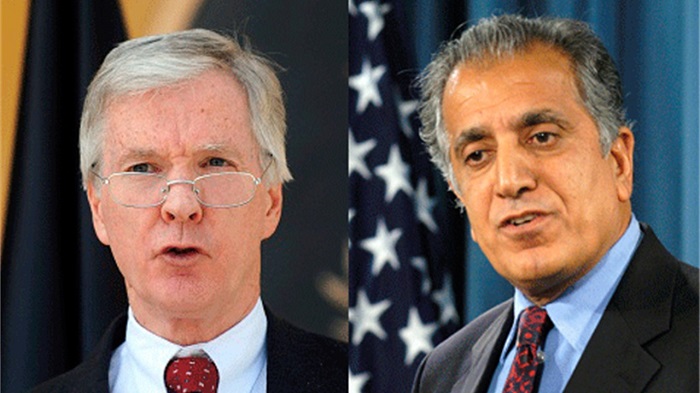
The State Department
The State Department’s listing of the MEK (PMOI) as a Foreign Terrorist Organization in 1997 was not the first time it released false information about the resistance organization.
On July 24, 1985, Richard Murphy, a top US State Department official, appeared before a US Congressional subcommittee to present testimony on developments in the Middle East. Near the end of his statement, he unexpectedly went off-topic and discussed the MEK (PMOI). Murphy branded the resistance organization as “militantly Islamic, anti-democratic, and anti-American.” He described the group as “Marxist” and alleged it “continues to employ terrorism and violence as standard instruments of their poetics.”
Subcommittee members were puzzled by Murphy’s attack on the MEK (PMOI). The rationale behind the remarks was not revealed publicly until two years later, during an investigation of the Iran-Contra scandal by the Tower Commission. In its investigation, the Commission obtained a letter addressed to a high-ranking Iranian official, dated July 9, 1986, written by Manucher Ghorbanifar, an Iranian working as an intermediary between the US and Iran to help free American hostages in Lebanon.
In the letter, Ghorbanifar listed numerous actions the US had taken to encourage the Iranian regime’s assistance in freeing the hostages and he wanted Iran’s mullahs to reciprocate. Ghorbanifar noted the “positive and constructive steps as a sign of goodwill” by the US during the previous year. Among the list of actions, he noted the US had issued “an official announcement terming the Mojahedin-e Khalq Organization terrorist and Marxist….”
Murphy’s testimony before Congress, it turns out, was a goodwill gesture to encourage the mullahs to help free the US hostages. It was not based on any evidence but a politically motivated quid pro quo.
The damage, however, had been done. The State Department is viewed as a reliable source of information. After Murphy’s testimony, the media began to describe the MEK (PMOI) as a terrorist group in news articles.
UK Prescription and De-Proscription
Following America’s lead, the United Kingdom in 2001 placed the MEK (PMOI) on its terrorist list. Jack Straw, the Minister responsible for the MEK (PMOI) designation, later acknowledged publicly that he had been asked by Iran’s Foreign Minister to include the resistance organization in the list. In a 2006 BBC interview, Straw said:
- “The very first meeting I ever had with an Iranian Foreign Minister Colonel Kharazi, now over four years ago, I expressed very serious concern about Iran’s continued support for these terrorist organizations [Hamas, Hezbollah, and Palestinian Islamic Jihad], at the same time as they were demanding successfully of me when I was the Home Secretary that we should ban a terrorist organization MEK that was working against Iran.”
The UK prescription of the resistance organization as a terrorist organization was not based on any evidence but was a political decision by the Home Secretary in response to Iran’s mullahs.
Members of Parliament strongly disagreed with the proposed prescription of the MEK (PMOI) as a terrorist group when the issue was brought before both Houses of Parliament. The government denied the members an opportunity to vote separately on each group proposed for proscription as a terrorist organization. Given the choice to vote against all the proposed groups or none, the MEK (PMOI) was proscribed as a terrorist group along with other organizations.
In 2006, 35 parliamentarians applied to the Home Secretary, seeking to de-proscribe the MEK (PMOI) from the UK terrorism list. The parliamentarians included, among others, the late Lord Slynn of Hadley, a former member of the UK Supreme Court and the Court of Justice of the European Union, and Lord Waddington, former Home Secretary under Margaret Thatcher.
The legal action on behalf of a “proscribed” organization by distinguished members of both Houses of Parliament was unprecedented. It demonstrated substantial support for the legitimacy of the MEK (PMOI)’s resistance against Iran’s authoritarian regime and undercut the validity of the government’s proscription decision. The Home Department rejected the submission by the parliamentarians and four months later they filed an appeal.
On November 30, 2007, a British court released its judgment on the appeal. It based its decision on 15 volumes of classified and public information on which the UK government said it had made its decision, as well as on documents and witness statements provided by the plaintiffs. The court stated, “having carefully considered all the material before us [classified and non-classified information], we have concluded that the decision” to keep the MEK (PMOI) on the list of terrorist organizations “was flawed and must be set aside.” The court reaffirmed the MEK (PMOI) was not an organization that “is concerned in terrorism” and described the Home Secretary’s decision to keep the MEK (PMOI) on the terrorist list as “perverse.”
The Home Secretary appealed the court ruling, claiming the MEK (PMOI) retained the potential to become a terrorist organization. This challenge was rejected on May 7, 2008. The court said, “The reality is that neither in the open material nor the closed [classified] material was there any reliable evidence that supported the conclusion that MEK (PMOI) retained an intention to resort to terrorist activities.” The count, in its judgment, scolded the actions of the Home Secretary:
- “It is a matter for comment and regret that the decision-making process, in this case, has signally fallen short of the standards which our public law sets and which those affected by public decisions have come to expect.”
In June 2008, the MEK (PMOI) was officially removed from the UK’s terrorism list.
EU Listing and Delisting
On May 2, 2002, the European Union designated the MEK (PMOI) a terrorist organization, offering no evidence or reason to support its decision. As in the UK and US cases, the EU listed the resistance organization as a terrorist group to mollify the Iranian regime.
Before the listing, Iran’s Foreign Minister Kamal Kharrazi had repeatedly urged the EU to proscribe the MEK (PMOI) as a terrorist group:
- On October 3, 2001, the Islamic Republic News Agency (IRNA) said, “In a meeting with Jorgen Krobog, Deputy Foreign Minister of Germany, Ali Ahani, Deputy Foreign Minister [of Iran], demanded a ban on the activities of the Mojahedin Organization in Europe.”
- In a meeting between Belgian Foreign Minister Louis Michel and Foreign Minister Kamal Kharrazi, an Iranian TV news program said on November 8, 2001, that Kharrazi “requested that the Monafeqin [MEK] be included on the list of terrorist organizations that the European Union is to compile by December.”
- On February 5, 2002, IRNA said, during a meeting with an EU delegation, that “the Deputy Foreign Minister on European and American Affairs urged for an unambiguous position and practical actions by the European Union in confronting the activities of Mojahedin organization.”
After the EU designated the MEK (PMOI) a terrorist group, the decision was praised by the Iranian regime. IRNA reported on June 6, 2002, meeting between Javad Zarif, then Deputy Minister of International and Legal Affairs, and Spain’s Under-Secretary of the Ministry of Foreign Affairs and Cooperation (at the time Spain held the EU presidency). IRNA said:
- “In his meeting, Zarif praised Spain for its positive endeavors adopted in the development of cooperation between Iran and the EU. The 8th comprehensive session of discussion between Iran and the EU took place last February in Madrid and the inclusion of the Monafeqin’s name [Mojahedin] was one of the points that materialized because of the constructive and positive role that Spain played during its presidency in the EU.”
Spain’s Ambassador to Iran commented on the MEK’s listing. He said “There were three issues that Iran wanted to address with the EU. When Spain was the president, the two sides were able to resolve these differences. One of the major issues was including the People’s Mojahedin Organization on the list of terrorist groups by the EU.”
Thousands of members of parliaments in Europe objected to the MEK (PMOI) terrorist designation and forwarded letters to European and national officials, demanding the removal of the resistance organization from the terrorist list.
The EU refused to reconsider its decision. It was later revealed publicly that the EU labeling of the MEK (PMOI) as a terrorist group was related to negotiations with the Iranian regime on nuclear issues. Agence France Presse published an article on the preparatory text of the EU 3 (UK, France, and Germany) in proposals regarding Iran’s nuclear program. The text said the EU 3 if Iran complied:
- “[W]ould cooperate in the prevention and suppression of terrorist acts by respective legislation and regulations. We would continue to regard the MEK (Iranian resistance group) as a terrorist organization.”
Several months later, Hassan Rouhani thanked the EU for placing the resistance organization on the EU terrorist list.
The MEK (PMOI) filed a petition with the Court of First Instance (now the General Court of European Community), challenging the terrorism designation. It took nearly four years for the court to issue its first ruling on the case.
On December 12, 2006, the court said the EU’s designation of the MEK (PMOI) as a terrorist group was unlawful because the Council had failed to substantiate its allegations of terrorism against the resistance organization. But the EU refused to implement the decision, arguing it was inapplicable. The EU said the court case responded to a Council vote on December 21, 2005, and the Council had issued a new decision after this date. Thus, the court action did not apply to the most recent EU vote and was irrelevant. (In truth, the EU’s action was a violation of relevant procedural rules of the EU.)
The MEK (PMOI) filed a new complaint. In October 2008, the Court of First Instance again sided with the resistance organization, stating the terrorist listing was unlawful. Again, the EU claimed the court ruling had failed to properly respond to its most recent Council decision in June 2008 to keep the MEK (PMOI) on the terrorist list, which superseded its earlier vote.
The MEK (PMOI) had filed another complaint after the June 2008 decision by the EU Council of Ministers. The Court of First Instance set a hearing date for the complaint on December 3, 2008. Typically, the court requires several months to deliberate a case. Given this timeframe, it was feared the EU Council would again take action on the MEK (PMOI) issue before the court ruled, once again rendering the court’s action irrelevant.
In a move unprecedented in its 50-year history, the Court of First Instance announced its decision on the MEK (PMOI) case the day after the hearing. For the third time, it directed the EU to delist the MEK (PMOI). It based its decision on procedural grounds, as well as the failure of the Council to provide evidence of the resistance organization’s terrorist activities.
By acting quickly, the court sought to block the EU Council of Ministers from issuing yet another decision against the resistance organization as a pretext to keep it on the terrorist list.
The EU Council of Ministers tried to postpone the implementation of the court ruling so it could relist the MEK (PMOI) as a terrorist organization during its January 2009 session. The court responded by directing the EU to implement its decision immediately.
On January 26, 2009, the Council of Ministers voted unanimously to remove the MEK (PMOI) from its list of terrorist organizations. The French government appealed the decision to the Court of Justice of the European Union and it later was rejected.
Police Raid NCRI Headquarters
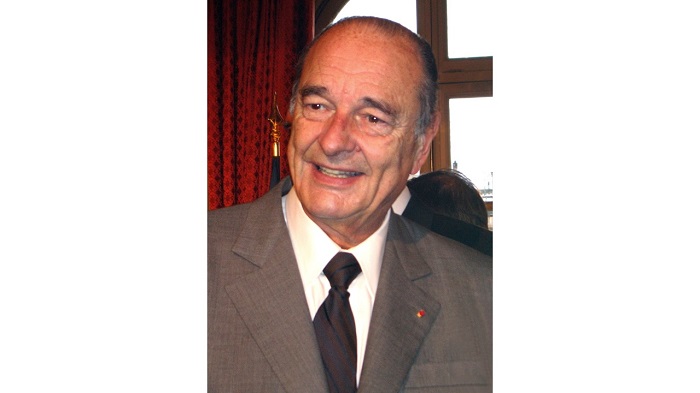
In the early dawn of June 17, 2003, about 1,300 French law enforcement officers, including 80 masked riot police armed with automatic weapons, stormed the headquarters of the National Council of Resistance of Iran (NCRI) outside Paris and the homes of the organization’s top leadership.
The police detained 164 people and seized the group’s operating funds, computers, and communication equipment. Most NCRI/MEK members were released two weeks later and 24 people were indicted for alleged “criminal association in relation with a terrorist enterprise.”
The raid was ordered by investigative magistrate Judge Jean-Louis Bruguière, who claimed the MEK (PMOI), a member of the NCRI, was “intent to prepare acts of terrorism and financing of a terrorist enterprise.” A Paris Court subsequently ordered the release of the remaining detainees, despite objections by Bruguière and the prosecutor.
The NCRI denounced the arrests and said they were instigated as part of a deal with the ruling mullahs in Iran and called for the case to be immediately sent to court for trial. NCRI officials were confident there was no evidence against its members and that a trial would provide them with an opportunity to expose the political deal between the French government and the mullahs’ regime.
Raid Politically Motivated
The raid on the NCRI headquarters by French authorities was politically orchestrated to gain the support of Iran’s rulers for French commercial projects pending in Iran. The raid had been in the planning stage for two and a half years by the French internal secret service (DST), according to a confidential report by Iran’s Ministry of Intelligence and Security. (French authorities had been investigating the resistance organization since 2001.)
Two months before the attack, a French delegation, headed by Foreign Minister Dominique de Villepin, had traveled to Tehran to meet with Iran’s foreign minister. Accompanying the delegation were several journalists, including Jean-Claude Maurice, the chief editor of the Journal de Dimanche.
Maurice published a book several years later, titled “If you repeat I will deny,” in which he revealed he had been present in a private meeting between French Foreign Minister Villepin and his counterpart in Tehran in April 2003. Maurice said he had witnessed talks about preparations for an operation against the MEK (PMOI). In the meeting, at the request of the Iranian regime’s Minister of Foreign Affairs, Villepin pledged to carry out the operation against the resistance organization and confided it was already underway. At the end of the meeting, Villepin noticed Maurice and asked, “Ah, what are you doing here? Did you hear everything? This is unbelievable! I hope you will forget everything. Our credibility lies in this.”
Villepin again traveled to Iran in May 2003 to “negotiate large contracts with his counterpart, who repeatedly asked questions about the Mujahedin in France,” according to the daily newspaper Libération. French companies were hoping to sign deals with Tehran to build power stations and an ethylene plant, develop gas fields, and participate in a joint venture with Renault to produce vehicles in Iran.
On June 17th, as promised to Iran’s mullahs, French authorities fulfilled their end of the bargain, conducting the police raid on the NCRI. Not long thereafter, French companies received commercial contracts in Iran. The French oil giant, Total, was selected for a multi-billion dollar deal, even though British Petroleum reportedly offered better terms. On October 28, 2003, Renault finalized a joint-venture agreement with Tehran to build vehicles in Iran.
In the raid, the police failed to find any evidence of the MEK’s involvement in, or financing of, terrorism to support its allegations against the resistance organization. As a result, French authorities initiated an orchestrated media campaign against the NCRI/MEK using false and malicious information. The French authorities sought to tarnish the reputation of the MEK (PMOI) to facilitate its conviction. It compiled a judicial file on the NCRI/MEK that contained thousands of documents. The materials included false and misleading information about the resistance organization’s political positions, internal relationships, and practices – all supplied by Iran’s Ministry of Intelligence and Security and its agents.
Seven well-known agents of the Iranian regime were interviewed nearly 30 times and their false testimonies were placed in the file. Two of the MOIS agents, Massoud Khodabandeh and his wife, Ann Singleton, testified nine times.
Terrorism Charges Dismissed
On May 11, 2011, ten years after French authorities opened an investigation on the MEK (PMOI) and eight years after the raid on NCRI headquarters in the Paris suburb, the Investigative Magistrate of Paris’ antiterrorism department issued an order (The Decision) dropping all charges of terrorism and financing of terrorism against the 24 members and supporters of the NCRI. The decision put an end to a terrible political injustice perpetrated against the NCRI/MEK by French authorities to gain favor with Iran’s tyrannical regime.
The Decision concluded that, after a thorough investigation, no evidence was found to support the alleged terrorism of the MEK (PMOI). It further recognized the right to resist tyranny and said the activities of the MEK (PMOI), even when it was engaged in a military campaign against the Iranian regime, fell within the ambit of legitimate resistance.
The Paris prosecutor’s office also acknowledged the absence of evidence against the NCRI/MEK and submitted a memorandum to the Magistrate recommending the dismissal of all charges.
The Magistrate said it reviewed the attacks carried out by the MEK/NLA against the Iranian regime and said the military actions should not be considered acts of terrorism. “In French law,” it stated, “a military offense leading to an armed battle between military personnel cannot be titled terrorism”.
The Magistrate stated the “targets [of the MEK/NLA attacks] were systematically government institutions, some military, and the armed activities were in response to the “Iranian regime’s crimes.” The Magistrate further stated there was no evidence the MEK/NLA had intentionally attacked any civilians.
Had civilians been targeted, the Magistrate explained they would be considered acts of terrorism and would have “annul[ed] any reference to resistance against tyranny, because resistance against tyranny as minimums requires that the tyrant, meaning the ruling regime, be targeted and not those oppressed, meaning the people.”
The Magistrate’s ruling supported the position of the MEK/NLA, which maintains it has an inalienable right to resist tyranny, as stated in Section 2 of the French Declaration of Human Rights and Citizenship. This right is recognized internationally, including by the Charter of the United Nations.
In short, the judge stated the operations of the MEK/NLA inside Iran were legitimate and not acts of terrorism. The judge reiterated the resistance organizations’ right to resist political repression and tyranny in Iran.
Thus, the outcome of the intensive investigation not only resulted in the acquittal of the MEK of any terrorism-related charges but recognized de facto the legitimacy of the MEK’s resistance.
MEK Vindicated
After the Investigative Magistrate of Paris ruling on May 11, 2011, nine members of the NCRI/MEK remained under formal investigation on alleged embezzlement charges. These charges were dismissed by the court on September 16, 2014.
The investigating judge announced, after a painstaking investigation, there was no evidence to prove “fraud,” “money laundering,” “forged documents,” “usurping identities,” “forced compliance of witnesses,” or any other offenses such as “concealing money earned by fraud,” had been committed by the NCRI/MEK and therefore declared the case closed.
This court ruling was a major judicial and political victory for the NCRI/MEK. It supported its position that the charges against them had been politically motivated and it brought to light the shady deals and disinformation campaign by Iran’s ruling mullahs.
Commenting on the court decision, Madam Maryam Rajavi, President-elect of the NCRI, said: “the French judicial system acknowledges that the resistance of the MEK, whether in the form of the National Liberation Army (NLA) or the MEK (PMOI) operations inside Iran, has been legitimate and is not considered terrorism.”
US Removes FTO Designation
Given the delisting of the MEK (PMOI) on both the UK and EU terrorist lists, one might have expected the US State Department to re-examine its decision to list the resistance organization on the FTO. But sadly this did not occur. It would take three more years before the State Department finally removed the PMOI from the terrorist list and it did so only after a US court threatened to delist the organization itself if the Department failed to act.
On July 15, 2008, the MEK (PMOI) petitioned US Secretary of State, Condoleezza Rice, to revoke its listing on the FTO list. No evidence was found by the UK court to warrant the MEK’s placement on the UK terrorism list and it was believed the US State Department would reach the same conclusion. But in early January 2009, just days before the end of the Bush Administration, Rice rejected the petition.
The MEK (PMOI) remained on the list for the same reason it had originally been designated – to gain favor with Iran’s ruling mullahs. The US also kept the group on the FTO in fear of Iran’s reaction if the MEK (PMOI) was delisted. In a conference in Paris on December 22, 2010, Frances Townsend, former Assistant to U.S. President on Homeland Security and Counterterrorism, shed light on why PMOI was not delisted. She said:
- “The listing of the PMOI or MEK began in the Clinton administration under the delusion that such a goodwill gesture might be received and reciprocated. That thinking failed. The subsequent Bush administration could have delisted the PMOI.
- “Let me put a sharper edge on why I think that did not happen and let us be honest. After 2003 we were in a very difficult fight in Iraq. We were losing our men and women in uniform and I can assure you, being in the administration, that that was a very painful reality. If there was anything you could do to save one American life or one soldier you would have done it. It led perhaps too bad judgment, because of course, if amid that fight in Iraq we had delisted the MEK, there was fear that it could have provoked a reaction from Iran.
- “Let’s be honest about why we failed during the Bush administration to delist. We were wrong. I know we were wrong not just because it was an unjust thing not to delist PMOI; I know we were wrong because of Iran’s reaction. What did they do as a result of our failure to delist the MEK? It would have progress if they had done nothing but they didn’t because the tyrannical regime in Iran believed that that failure to delist the PMOI was a weakness, not strength. We know how the tyrannical regime in Iran reacts to perceived weakness. They became more aggressive and they permitted, encouraged, and enabled the transfer of parts for electronically formed projectile weapons produced in Iran across the border into Iraq which killed our soldiers. So, they do not understand goodwill. Their response to goodwill is direct aggression against US forces.”
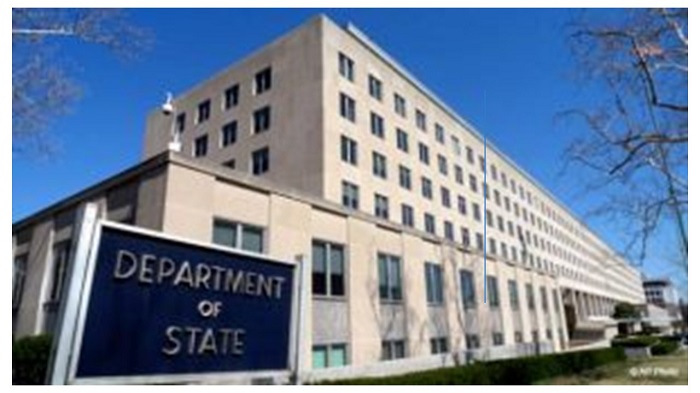
After Secretary Rice rejected the MEK (PMOI) petition, the resistance organization filed a complaint in a US court against the State Department’s decision. The Department is required by law to review an organization’s FTO listing based on factual material and not politics. When the European courts examined the MEK’s factual record, they concluded the resistance organization should not be listed as a terrorist group. The MEK (PMOI) hoped the US court would reach the same conclusion.
On July 16, 2010, the US court ruled the Secretary’s decision was illegal. The court noted that “a strict and immediate application of the principles of law” outlined in the decision “could be taken to require a revocation of the designation.” But due to the “realities of the foreign policy and national security concerns,” the court opted instead to remand to the Secretary instructions to provide the MEK (PMOI) “the opportunity to review and rebut the unclassified portions of the record on which she relied.”
The State Department realized it would have to delist the MEK (PMOI) based on the court’s instructions and criteria since there was real evidence to support its listing. At the same time, the Department feared it would inflame US relations with Iran’s mullahs if the MEK (PMOI) were removed from the list. The Department ended up doing nothing, hoping to delay a decision as long as possible.
Iranian Regime Lobby
The Iranian regime conducted a massive campaign against the delisting of the MEK (PMOI). Letters were circulated among so-called independent experts by the regime’s lobby, calling on the Department of State to maintain its terrorist designation for the MEK (PMOI).
Pro-Iranian lobbyists in Washington, D.C. placed articles in media outlets and websites, attacking the MEK (PMOI), and disseminated false information, claiming the MEK (PMOI) would harm US national security and democracy in Iran it was delisted. The reaction of the National Iranian American Council, a pro-Iranian regime lobbying organization, is typical of the disinformation distributed by the Iran Lobby in the US. It alleged the delisting of the MEK (PMOI) “would be disastrous for Iran’s nonviolent democratic opposition.”
Pressure Grows to Delist MEK (PMOI)
The al-Maliki Administration in Iraq had pledged to make life “unbearable” for the residents of Camp Ashraf. In July 2009, Iraqi armed forces attacked the unarmed residents, killing 11people and wounding many others. Iraqi armed forces, in the second attack on April 8, 2011, murdered 34 residents and wounded 318 others.
The situation at Camp Ashraf was growing direr with each passing day. Former senior officials from four past Administrations joined together in support of the PMOI. They understood the urgency to remove the PMOI from the terrorism list to avert further bloodshed at Camp Ashraf and pressed the State Department to immediately delist the resistance organization from the FTO.
Members of Congress, who had access to classified information about the MEK (PMOI), affirmed there was nothing classified to justify maintaining the MEK (PMOI) on the terrorism list. Ninety-seven bipartisan members of Congress cosponsored H. Res. 60, which called on the Secretary of State to remove the MEK (PMOI) from the FTO.
The high-ranking officials objected to the placement of the MEK (PMOI) on the terrorism list as a means to mollify Iran’s mullahs. The ends did not justify the means and made of mockery of US law. They demanded the US government implement the court ruling and delist the MEK (PMOI).
Lawyers at the State Department repeatedly signaled they would act soon in response to the court decision, but then repeatedly failed to do anything. Given the State Department’s intransigence, the MEK (PMOI) filed a “writ of mandamus” on February 27, 2012, a legal procedure to force the Department to take action.
Twenty-one former, high ranking, American officials involved in national security filed a “Friends of the Court” petition in support of the MEK (PMOI). They said, “the continued designation of MEK (PMOI) is not only unjustifiable under the statutory standards, but is also harmful to the interests of the United States and the security of this nation.”
Keeping the MEK (PMOI) on the terrorist list, they stated, “places in harm’s way individuals [at Camp Ashraf] whom this nation promised to protect, and serves as an excuse for those persons’ enemies to visit harm upon them.” The American officials chastised the State Department for its “foot-dragging and failure to timely comply” and they urged the court to take swift action. “Lives are at stake,” they asserted. “The presence of the MEK (PMOI) on the list of terrorist organizations itself places thousands of people at Camp Ashraf in jeopardy and interferes with the ability to move them to safety.”
Court Accepts MEK’s Complaint
To the surprise of the State Department, the US court accepted the MEK’s complaint and set a hearing date for May 8, 2012. Three weeks later, on June 1st, the court announced a deadline of four months for the State Department to take action, otherwise, it indicated it would delist the MEK (PMOI). The court’s ruling proved to be a historical achievement and was the first writ of mandamus issued against the US Secretary of State in 200 years.
The State Department continued its delaying tactics to the very end. Not until September 21, 2012, just days before the court deadline, did Secretary Clinton finally notify Congress of her decision to remove the MEK (PMOI) from the list of Foreign Terrorist Organizations. The resistance organization was officially delisted on September 28, 2012, ending a 15-year-long saga.
Reaction from Iran’s mullahs was immediate. Tehran officials condemned Secretary Clinton’s decision, as did US organizations aligned with the Iranian regime. Trita Parsi, the head of the National Iranian American Council (NIAC), called the delisting a “disaster for the Iranian people and the US and a gift for the Iranian regime.” In reality, the removal of the MEK (PMOI) from the terrorism list was a gift to the Iranian people and a disaster for Iran’s mullahs.
Applauding the State Department decision, Alejo Vidal-Quadras, Vice President of the European Parliament said:
- “The PMOI stood firm against terrorist labels in the UK, European Union, and the United States. Their strength in confronting the severe consequences of this label is indicative of their commitment to democracy and the level of support they enjoy. Despite previous massacres and false accusations, the PMOI maintains their aspirations for a free and democratic Iran. I believe that these people will make the future of their country.”
The State Department, to this day, refuses to acknowledge it falsely listed the PMOI as a terrorist organization for political purposes.
Summary
The US government enacted anti-terrorism legislation in 1996 that authorized the US State to designate an organization as a Foreign Terrorist Organization (FTO) “upon finding that the organization is a foreign organization that engages in terrorist activity and such activity threatens the security of US nationals or US national security.”
To curry the favor of Iran’s mullahs, the State Department perverted the law by placing the MEK (PMOI) on the FTO for political purposes and not because of evidence to warrant the designation.
The law requires the State Department to create a “record” to support a decision to place a group on the FTO. Regarding the MEK (PMOI), the State Department gathered false information about the resistance organization that was generated by Iran’s Ministry of Intelligence and Security to demonize the resistance organization.
Independent assessments of the MEK (PMOI) were provided to the State Department that refuted its claim that the organization was involved in terrorist activity and threatened the security of the US. The State Department refused to fairly evaluate the materials and relied on Iranian regime propaganda.
With the State Department unwilling to consider factual evidence in its evaluation of the MEK (PMOI), the resistance organization turned to the courts. The courts examined open and classified sources of information and determined the evidence did not support the MEK’s placement on the terrorist list.
The United Kingdom, France, and the European Community also tagged the MEK (PMOI) a terrorist organization to gain favor with the Iranian regime. The court cases in Europe contesting the MEK’s terrorist designation all concluded the resistance organization should not be listed as a terrorist group.
Following the court rulings in the MEK’s favor, in every instance, the governments of the US, UK, France, and EU delayed taking action as long as possible to delist the resistance organization. Finally, on September 28, 2012, the MEK (PMOI) was removed from the last terrorist list.
For more than 30 years, Western powers have repeatedly undermined the pro-democracy MEK (PMOI) in quid pro quo deals to obtain assistance from the Iranian regime or win commercial contracts. To purchase the favor of the tyrannical mullahs, the Western government falsely branded the MEK (PMOI) as terrorists and Marxists, withdrew government security forces protecting resistance organization members, shut down offices, raided the NCRI headquarters, arrested its leadership, bombed camps in Iraq that killed nearly 50 people, refused to create independent panels to investigate attacks by Iraqi forces against unarmed MEK (PMOI) members at Camps Ashraf and Liberty, placed the resistance organization on terrorist lists without supporting evidence, and then challenged the court decisions to delay as long as possible the delisting of the MEK (PMOI).
The Western governments achieved little in return for undermining the pro-democracy MEK (PMOI). Their many attempts to bring about a rapprochement with Iran all failed. The regime has not moderated its military ambitions or support of terrorist groups. The mullahs have continued unabated to develop a nuclear weapon and a long-range missile delivery capability.
By undermining the pro-democracy MEK (PMOI), the Western governments have strengthened the Iranian regime and weakened pro-democracy efforts within Iran. As a result, the many actions of the Western governments to undermine the MEK (PMOI) to gain concessions from the Iranian regime must be viewed as a major policy failure and a terrible injustice to resistance organization.

